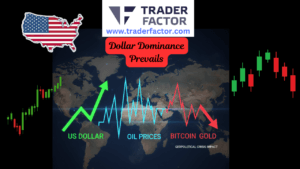World stock markets were on track in their first weekly advance in a month, and Wall Street seemed slated to start higher on Friday on optimism that falls in copper and other commodities may put a stop to runaway inflation.
Commodities have fallen sharply this week on fears that the global economy is in trouble and that interest rate hikes will harm growth, forcing traders to lower inflation predictions and reduce wagers on the extent of the hikes.
“Inflation will continue to be elevated and above target, but it’s increasingly likely that it will begin to peak in the coming months,” said Andrew Hardy, investment manager at Momentum Global Investment Management.
“Markets may take it fairly well; there is a possibility for a rebound later this year.”
The S&P 500 futures in the United States surged 0.9 percent, and the MSCI world equity index gained 0.5 percent on the day and 2.5 percent for the week, putting it on track for its first weekly gain since May.
Copper, a leading indicator of economic production because of its wide range of industrial and construction applications, is on track for its biggest weekly fall since March 2020. It plummeted in London and Shanghai on Friday, and it is now down more than 7% for the week.
Tin plunged over 15% on Friday, bringing the week’s losses to a record 25%, as investors fear that slower economic development will diminish demand for the metal used in electronic solder.
Brent crude futures increased more than $1 to $111.28 per barrel on Friday, but are still down 2% for the week and 10% for the month, while comparable grain prices fell, with Chicago wheat down more than 8% for the week.
For commodities trading, Gold was up 0.2 percent at $1,826.30 per ounce, but was on track for a second weekly loss.
Since oil and food have been the drivers of inflation, the price cuts have provided some relief to equities.
When it comes to stocks trading, European stocks (.STOXX) gained 1.5 percent, putting them on track for a slight weekly gain. The FTSE (.FTSE) in the United Kingdom increased 1.3 percent, a tiny increase over the previous week.
“The thesis hasn’t changed for long-term traders: declining markets offer more appealing values on high-quality companies with a competitive edge,” said Lewis Grant, senior portfolio manager for global equities at Federated Hermes.
The Federal Reserve’s commitment to containing 40-year-high inflation is “unconditional,” according to US central bank president Jerome Powell, who also acknowledged that drastically higher interest rates may increase unemployment.
If Russian gas supplies remain as low as they are today owing to the Ukraine crisis, Germany will face a gas shortage, and certain sectors would be forced to close if there isn’t enough come winter, Economy Minister Robert Habeck told Der Spiegel magazine on Friday.
As of Friday, Ukraine reported that Russian soldiers had “completely captured” a village south of the strategically significant city of Lysychansk in the eastern Luhansk region. more info
Bonds rose sharply on optimism that bets on aggressive rate hikes would be reduced, with German two-year rates falling 26 basis points on Thursday, the most since 2008.
The German 10-year yield was down 4 basis points on Friday, after falling 29 basis points the previous day, and was on track for its first weekly decrease since mid-May.
The benchmark 10-year Treasury yield rose 4 basis points to 3.1076 percent, after sliding 7 basis points on Thursday.
Bond funds saw their highest withdrawals since April 2020 in the week to Wednesday, while equities shed $16.8 billion as markets remained in bear mode, according to BofA’s weekly flow report released on Friday.
The US dollar has fallen from 20-year highs reached last week. The euro rose 0.23 percent to $1.05470, while the US dollar remained unchanged at 135.03 yen.
The damaged yen has stabilized this week and gained some support on Friday after Japanese inflation surpassed the Bank of Japan’s 2 percent target for the second month in a row, placing more pressure on the central bank’s ultra-easy policy stance. more info
MSCI’s broadest index of Asia-Pacific shares excluding Japan (.MIAPJ0000PUS) climbed 1.1 percent, aided by short sellers bailing out of Alibaba (9988.HK), which rose over 6 percent, amid signs that China’s technological crackdown is loosening.
The Nikkei (.N225) in Japan climbed 1.2 percent for a 2% weekly gain.
Disclaimer:
All information has been prepared by TraderFactor or partners. The information does not contain a record of TraderFactor or partner’s prices or an offer of or solicitation for a transaction in any financial instrument. No representation or warranty is given as to the accuracy or completeness of this information. Any material provided does not have regard to the specific investment objective and financial situation of any person who may read it. Past performance is not a reliable indicator of future performance.


















